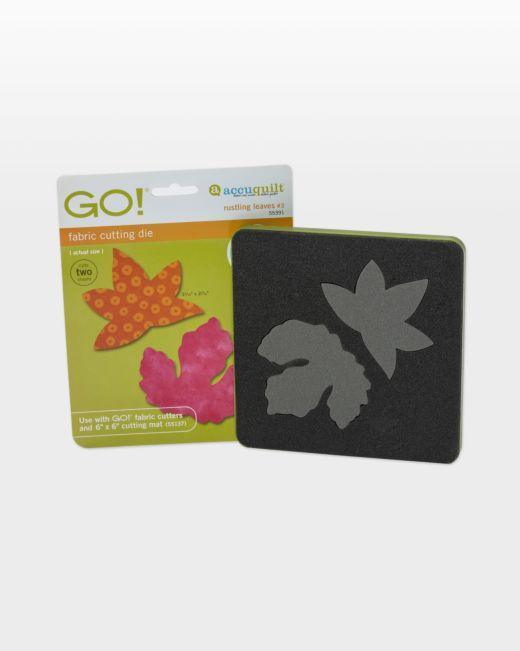GO! Rustling Leaves #3 – Sweetgum and Poplar (Small) Die (#55391) – Discontinued AccuQuilt
$ 45,99 $ 27,59
This die easily cuts one smaller shape of Sweetgum and one Poplar leaf. Great for creating projects for all seasons by just changing the colors of the leaves. Apply fusible web to the wrong side of fabrics prior to cutting for quick and easy applique.
AQ Cutting Mat Required:Â GO! Cutting Mat, 6 in. x 6 in. 2 Pack (15.2 cm x 15.2 cm) Item 55139
How to Die Cut Rustling Leaves #3 Shapes:
Apply fusible web product to the wrong side of the fabric, following manufacturer’s instructions, before cutting for fusible appliqué. Â
- Sweetgum Leaf: Cut and fuse 3″ x 3 3/4″ rectangles. Cut 13 leaves across the width of fabric. One yard of 40″ wide fabric cuts 117 leaves.Â
- Poplar Leaf: Cut and fuse 3 1/2″ x 4″ rectangles. Cut 11 leaves across the width of fabric. One yard of 40″ wide fabric cuts 99 leaves.
Why Quilters Love the GO! Rustling Leaves #3 Die:Â
- The Rustling Leaves #3 die easily cuts one smaller Sweetgum leaf shape and one Poplar leaf shape. Great for creating projects for all seasons by just changing the colors of the leaves.Â
- No templates required! The GO! Rustling Leaves die includes applique shapes that are typically difficult to cut by hand.Â
- Great value! Get multiple applique leaf shapes for the price of one GO! Rustling Leaves die. • Quickly and easily cut four of each pre-fused applique shape in one pass thru the cutter (fusible counts as one half layer of fabric).Â
- Cut leaves out of a variety of fabrics: cotton, batiks, wool, felt, flannel, fleece, Cuddle® fabrics and more!Â
- A great way to use up scraps.Â
- Free pattern downloads available to get you started.Â
- Charm Pack-friendly.
AccuQuilt Benefits:Â
- Cut so much more fabric in less time.Â
- Get accurate cuts every time — No slipping rulers or mistakes
- Easiest to use — Simply place die on cutter, then fabric and cutting mat on top
- Save fabric with Two Tone Foam — Get more out of your fabric by placing it only over the shape you want to cut.Â
- Safe to use — No blades come anywhere near your fingers
Die Tips:Â
- With some fabrics, after cutting, a thread or two will remain where die blades meet. Snip threads with scissors.Â
- Blades on some dies are positioned at an angle. Align fabric to edge of shape, not edge of die board.Â
- Use good quality fabric to reduce fabric stretch.Â
- It’s always a good idea to test cut one shape before cutting many shapes to ensure fabric orientation is correct.Â
Fast Shipping and Professional Packing
Thanks to our longstanding association with UPS FedEx DHL and other leading international carriers, we are able to provide various shipping options. Our warehouse employees will pack every item to our exacting specifications. Your goods will go through an exhaustive inspection and securely secured prior to being delivered. We ship to thousands clients each day across multiple countries. This shows our commitment to be the largest online retailer in the world. Warehouses and distribution centers are located in Europe and the USA.
Orders with more than 1 item are assigned processing times for each item.
Before shipment, all ordered items will be thoroughly examined. Most orders today are shipped in 48 hours. The delivery estimate is between 3-7 days.
Returns
The inventory is constantly changing and we cannot control it completely because several parties are involved, including our factory and warehouse. The stock can change at any time. Be aware that your order will run out of stocks when you have placed the order.
Our policy is valid for 30 days. We will not return or exchange your purchase after 30 days from the date of purchase.
In order to be eligible for a refund your product must be unopened and in the same condition as when you received it. The item must be returned in its original packaging.
Related products
AccuQuilt Cutting Die
GO! Bowties – 4″ Finished by Alex Anderson Die (#55413) – Discontinued AccuQuilt
AccuQuilt Cutting Die
AccuQuilt Cutting Die
AccuQuilt Cutting Die
AccuQuilt Cutting Die
GO! Blazing Star – 6” Finished by Eleanor Burns (#55051) AccuQuilt
AccuQuilt Cutting Die
GO! Apple Core – 6 3/4″ (6 1/4″ Finished) (#55036) AccuQuilt
AccuQuilt Cutting Die
GO! Big Square – 10 – 1/2” (10” Finished) (#55592) AccuQuilt
AccuQuilt Accessories
AccuQuilt Cutting Die
AccuQuilt Fabric Cutters
GO! Big® Electric Fabric Cutter Starter Set (#55500) AccuQuilt
AccuQuilt Cutting Die
AccuQuilt Cutting Die
AccuQuilt Cutting Die
AccuQuilt Cutting Die
AccuQuilt Cutting Die
AccuQuilt Cutting Die
AccuQuilt Cutting Die
AccuQuilt Cutting Die
AccuQuilt Cutting Die
AccuQuilt Cutting Die
AccuQuilt Cutting Die
GO! Carefree Alphabet Lowercase Set (2 – Die Set) (#55491) AccuQuilt
AccuQuilt Cutting Die
AccuQuilt Cutting Die
AccuQuilt Cutting Die
AccuQuilt Cutting Die
AccuQuilt Cutting Die
AccuQuilt Cutting Die
AccuQuilt Cutting Die
AccuQuilt Cutting Die
AccuQuilt Cutting Die
GO! Big Double Wedding Ring – 12 1/2” Finished (#55258) AccuQuilt
AccuQuilt Cutting Die
AccuQuilt Cutting Die


































